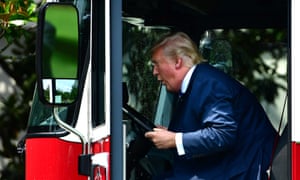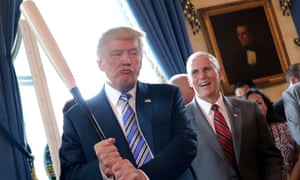By
Robert Reich
 What
did Trump say when confronted with proof that his son jumped at the prospect of
meeting with a “Russian government attorney” offering to dish dirt on
Hillary Clinton as “part of Russia and its government’s support” for his
candidacy?
What
did Trump say when confronted with proof that his son jumped at the prospect of
meeting with a “Russian government attorney” offering to dish dirt on
Hillary Clinton as “part of Russia and its government’s support” for his
candidacy?
Trump
said: “many people would have held that meeting.”
The
next day, Trump revised “many” to “most,” saying: “I think from a practical
standpoint, most people would have taken that meeting. . . . Politics isn’t the
nicest business in the world, but it’s very standard.”
It’s
true that politics isn’t the nicest business in the world. I’ve been there.
Real estate development isn’t the nicest business in the world either, for all
I know. But breaking the law and flirting with treason isn’t standard practice
in either realm.
Much
ink has been spilled over the last six months documenting Trump’s tin ear when
it comes to all matters ethical:
- His refusal to put his business into a blind trust, as every one of his predecessors in recent memory has done.
- His refusal to reveal his tax returns, like his predecessors.
- The never-ending stream of lies that he continues to spew even after they’re proven to be lies (three to five million fraudulent votes, Obama spied on me, fake news, and so on).
None
of this is “very standard” for presidents. It’s the opposite of standard.
I
think we’ve been missing the boat by characterizing these as ethical breaches.
Ethics assumes some sort of agreed-upon standard against which an ethical
breach can be defined and measured.
But
Donald Trump doesn’t live in a world that has any standards at all, and he
never has. His entire approach to life, to business, and now to the presidency
has nothing whatever to do with standards.
Winning
at all costs is
the only thing that’s standard in Trumpworld.
When
he was in business and couldn’t repay his creditors, he declared bankruptcy.
Again and again.
And
when his bankers finally wised up and refused to lend him any more money, he
found foreign bankers who would oblige.
When women complained about sexual harassment, he paid them off.
Trump
has spent most of his life in business being sued or suing – as if our judicial
system was just another standard tool for winning.
To
make a name for himself in politics, he suggested Barack Obama wasn’t born in
America. Hey, whatever it took.
To
win the presidency he told lies about undocumented immigrants and crime, about
Arabs cheering as the World Trade Center went down, about his business
smarts.
He
promised his followers he’d jail Hillary Clinton, drain the Washington swamp,
build a wall along the Mexican border, create vast numbers of jobs, repeal the
North American Free Trade Act.
He’d
lie about anything. He’d promise anything. All was just a means to becoming
president. There are no standards. Whatever it took.
“I
could stand in the middle of 5th Avenue and shoot somebody and I wouldn’t lose
voters,” he said.
Did
he collude with Russia to become president? That wouldn’t be standard practice
in politics, but it would be consistent with Trump’s standard.
“I
said [to Putin] ‘Did you do it?’” Trump reported back on his meeting with
Vladimir. “And he said, ‘No, I did not. Absolutely not.’ I then asked him a
second time in a totally different way. He said absolutely not.”
And
that’s supposed to be the end of it?
The
U.S. intelligence community has told Trump that Russia
interfered on his behalf in the presidential election of 2016, at Putin’s
direction. So why does Trump ask Putin if he did it?
He
should be telling Putin what the United States is planning to do in response to
what Putin did.
We
may never know the exact answer to whether Trump himself colluded with Putin to
win the presidency.
Or,
more likely, his core supporters may never know, because Trump will tell them
not to believe whatever Special Counsel Robert Mueller and the intelligence
agencies come up with, and to blame the press for reporting fake news.
Politics
isn’t’ the nicest business in the world, he might say, but whatever he did was
very standard.
A
president’s major responsibilities are to protect the United States and the
Constitution, and to see that the laws are faithfully executed.
But
Trump’s major goal now is to remain in power and to accumulate even more money.
Whatever
it takes.
ROBERT
B. REICH is Chancellor's Professor of Public Policy at the University of
California at Berkeley and Senior Fellow at the Blum Center for Developing
Economies. He served as Secretary of Labor in the Clinton administration, for
which Time Magazine named him one of the ten most effective cabinet secretaries
of the twentieth century. He has written fourteen books, including the best
sellers "Aftershock", "The Work of Nations,"
and "Beyond Outrage," and, his most recent, "Saving
Capitalism." He is also a founding editor of the American Prospect
magazine, chairman of Common Cause, a member of the American Academy of Arts
and Sciences, and co-creator of the award-winning documentary, INEQUALITY FOR
ALL.
